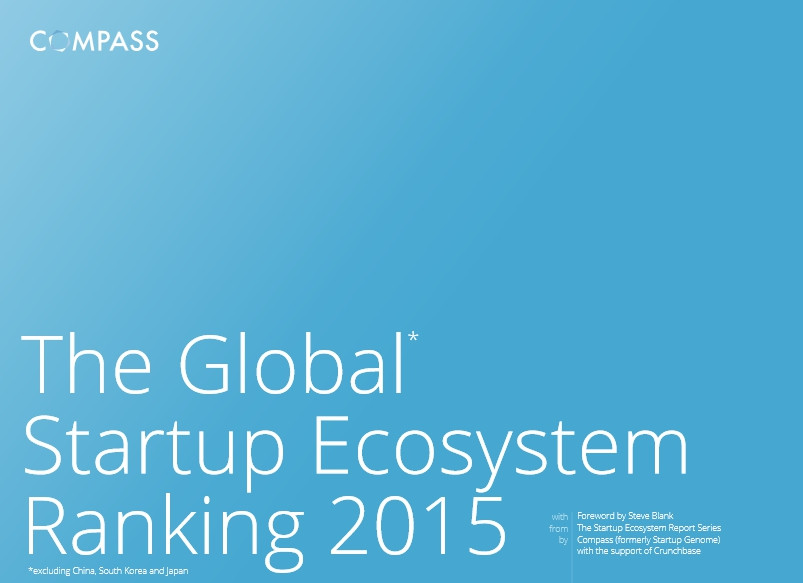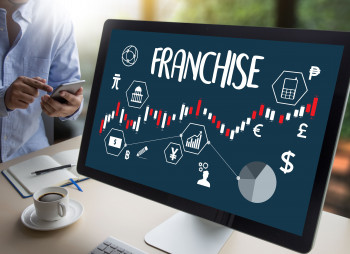This ranking represents 20 biggest startup systems of the world, unfortunately Kyiv hasn`t become one of those yet.
The report was made on the basis of analysis of data of more than 11 thous startups, end also expert interviews of 200 entrepreneurs from 25 countries from all over the world. As part of preparation were used databases and consultant expert reports of CrunchBase, Orb Intelligence, Deloitte, Dealroom, Global Entrepreneurship Week. The work has found the support of Ron Berman from Wharton Business School, Tomas Funke from Ministry for Economics and Technology and also famous American entrepreneur, creator of successful startups, Steve Blank.
Introductory note to The Global Startup Ecosystem Ranking 2015 report was written by Steve Blank. And the main idea is following. 50 years ago 4 American companies (DuPont, Standard Oil, General Motors и Sears) realized that their structures and approaches are unequal to the needed strategic shifts, and started experimenting with corporate organizational structure. That was the trigger that provoked changing of rules on the market? And through the numerous shifts it led to development of the global startup-structure.
If at the beginning of the previous century companies were solving the geographical problem of management and involved the middle class in the process, than at the beginning of 21st century we have other problems: we live in the flat and instantaneous world, where all are connected, the price for enter of new businesses decreased, innovations spread throughout the world and rivalry is getting more and more serious. High and increasing availability of the Internet generates a need for rethinking about a lot of markets. The wave of groundbreaking innovations is not only going through the technological markets but also exterminates a lot of formed and predictable industries
A solid number of innovations is coming from the young players, who are not scared to destroy the status quo. Existing corporative strategies ones again differ from the changing economy. The main problem, which will be on the way of ell modern businesses, can be represented as a question: how to build the effective organization under the “groundbreaking innovations”, when old rules and structures are not operational? You should adjust your strategy to the three key concepts: “break”, “stable innovation” and “implementation”.
Nowadays democratization of entrepreneurism creates new strategies and structures – the experience of modern startups will lay the foundation of massive corporative restructuring. Then we will see that current developments on the market are the revolution in the so called Wired World. The following could be pitched up from the Tim Blank`s speech. And now numbers, infographics and summaries.
Trends which specify the state of economy
- Economy experiences the great shift from industrial to information revolution.
- The rivalry is growing: because of the economic liberalization and enter price drop, during last 40 years it increased twofold.
- Informational transparence doesn`t allow to for the brand independently – the consumer can easily find the lower price and negative feedbacks. Even if you take a niche, where there is no transparence yet, you can be sure that somebody is already working on this. If during the industrial era business was built on the selling and marketing, than during the information era the accent on the design and engineering allows to create even more successful product, which will win the race on conditions of informational transparence.
- Consumption decreases. People buy new staff less frequently and more often sell things on services like eBay and Craigslist. Carsharing services and cheap taxi like Uber allow people to declare off the privately owned cars, and Airbnb – off hotels. The growth of Renting Economy connected not only with sparingness at the time of unstable economic conditions, but also with the growing ecological awareness.
- Groundbreaking innovations are the ideology of economy of the future. Earlier the profitability could be increased, by using two triggers – revenue escalation or cost lowering. But the rivalry is still growing and old approach leads only up to the degradation of main quality categories and income decrease. So the single way is groundbreaking innovations, namely products and services which correspond to the requirements of informational sphere. Groundbreaking innovations need new approaches, instruments and culture. Role of the technological entrepreneur in the global economy is far more important than ever – obviously that it will become the generator for transition to the new economic era.
- «Blue chips» had lost their value and they have quite doubtful perspectives of growth. In the process of economical evolution startups had taken their place. Average life span of the companies from the S&P 500 list has dropped from 65 to 15 years since 1920 – it means the decline of blue chips and rising of the role of startups in economy. Social evolution depends on groundbreaking innovations, which offer technological startups to society. That`s why the role of global startup ecosystem is very important.
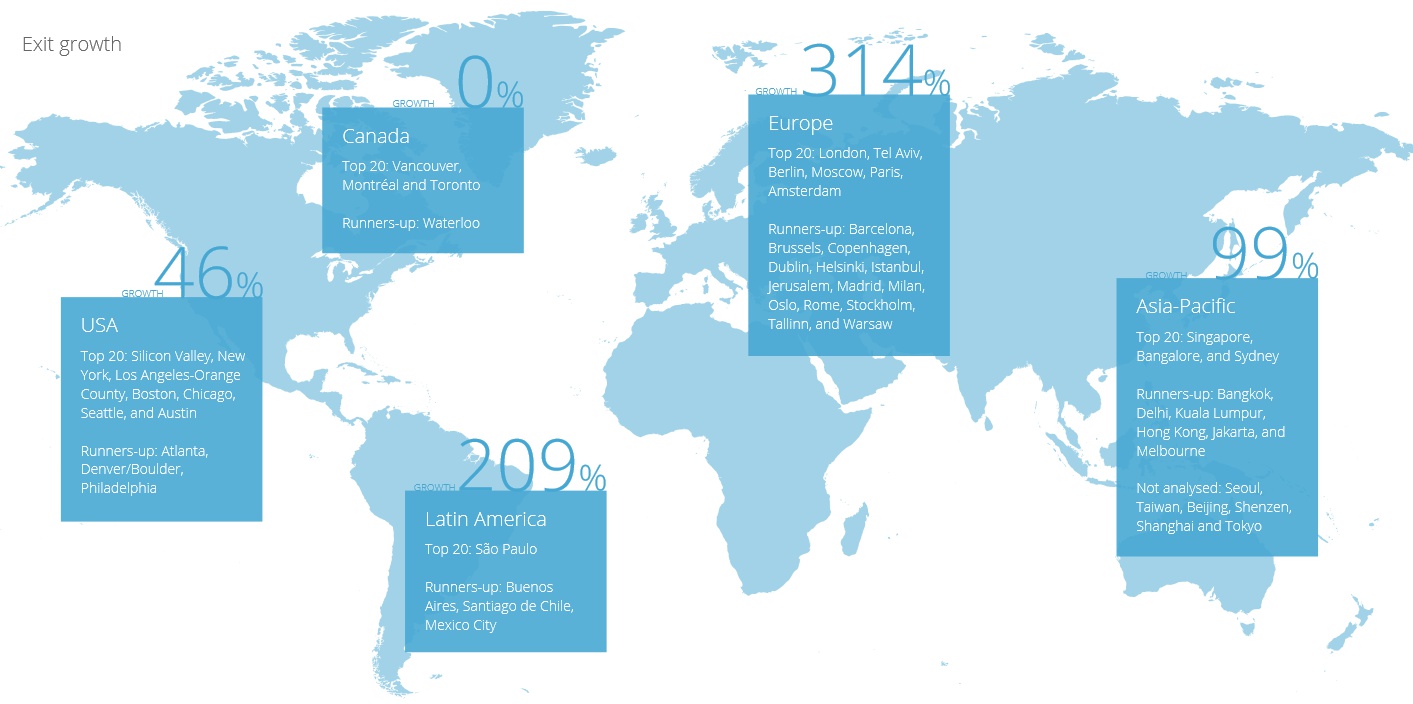
Functioning of global startup ecosystem
What is the difference between the average small business and technological startup? If you are starting a traditional small business, you have pretty good chances to succeed during the first two years. And if you are starting a startup, even having an excellent idea, team, product and business plan for fund raising, the possibility of the failure is 75%. However small business will never be in the Fortune 500 list or have a workforce of 10 000 people, and startup have all the chances to enter the highest echelons of business.
For traditional banks the business model of young startups always seems to be too risky, and VC-companies are interested in investing startups, which show impressive growth figures. On the early stage of development startups start to receive the support from business-angels and accelerators. Business model of center with acceleration programs in a way hacked the sphere of investment. Accelerators during three month prepare companies for the first investment, give founders an access to mentors, and in exchange take 5-10%. Usually investment on early stages can be found by means of networking in local startup ecosystems.
Previous Startup Ecosystem Ranking was released in 2012, and since than local startup ecosystems developed quickly. At the center of the attention of the new report lies so called Global Ecosystem Index,the ranking of 20 startup ecosystems throughout the world.
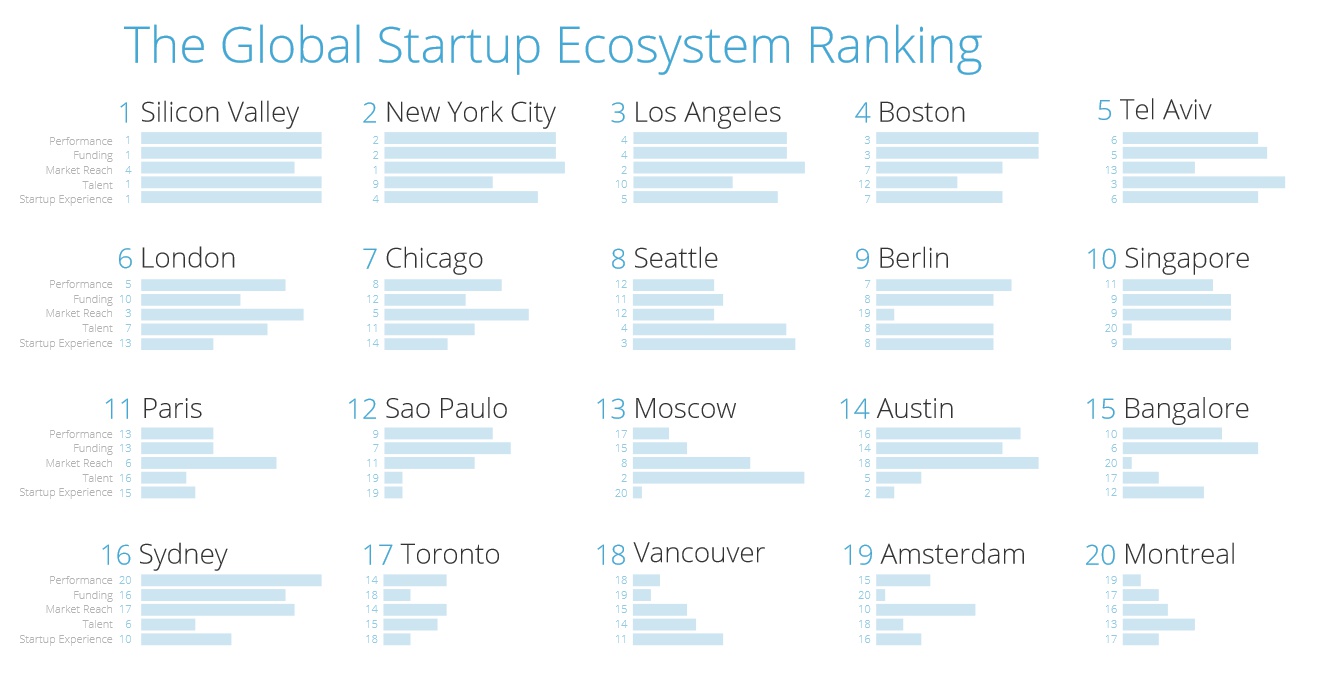
In the top 20 of global startup ecosystems, according to The Global Startup Ecosystem Ranking 2015, are included: 1) Silicon Valley 2) New York 3) Los Angeles 4) Boston 5) Tel Aviv 6) London 7) Chicago 8) Seattle 9) Berlin 10) Singapore 11) Paris 12) San Paolo 13) Moscow 14) Austin 15) Bangalore 16) Sydney 17) Toronto 18) Vancouver 19) Amsterdam 20) Montreal
The leader of the list, according to the research, became Silicon Valley. Next 3 positions also belong to American cities - New York, Los Angeles, Boston. Tel Aviv rounds out the top five. The main criteria of the estimation are: availability, amount of venture funding, investment effectiveness, qualification and level of specialists` income, opportunities of entry into local or foreign markets, and experience in creation and development of startups.
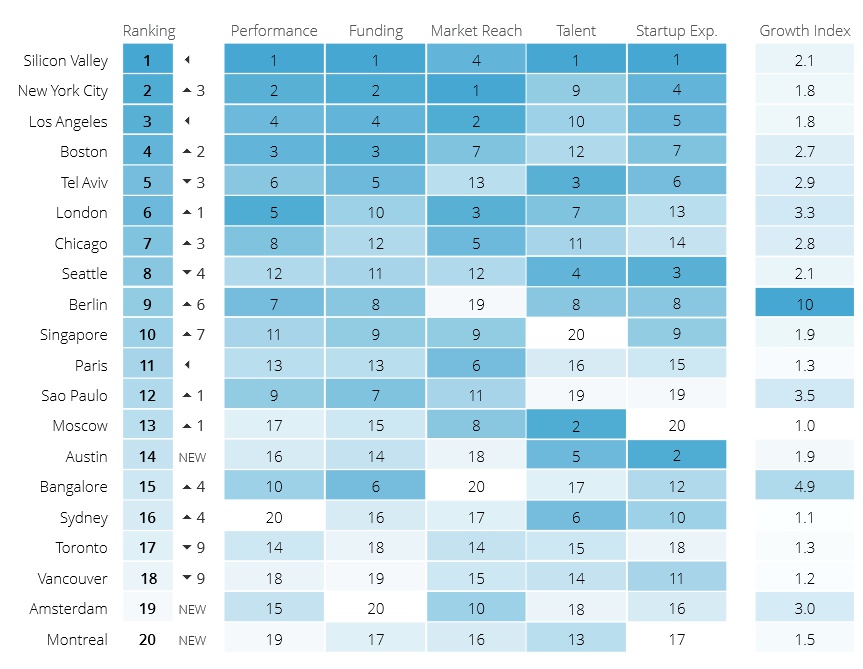
Certain figures
- In 2013-2014, the global startup ecosystem increased 95%. The family of European ecosystems (London, Moscow, Paris, Amsterdam, Berlin, Tel Aviv) shows the biggest growth – 314%. For the comparison: ecosystems of USA – 46%, Asian – 99%, Latin-American – 209% and Canadian – 0%. All 20 startup ecosystems increased in quantity of startups. In general the number of startups, which received seed-investments, increased 9%. Ecosystems of startups with the biggest growth of seed rounds for the last 3 years: Bangalore (53%), Sydney (33%), Austin (30%). Boston, Vancouver and Montreal are stagnating and Moscow startup ecosystem slowed down - the average number of investment rounds decreases 32% per annum during last 3 years, however the quantity of new startups is still high.
- In the global startup ecosystem is noticeable the growth of businesses, where founders are women: plus 80% for last 3 years. If in 2012 women created 10% of startups in the top 20 of ecosystems, than in 2015 it changed into 18%.
- The Silicon Valley is still a leader: there are concentrated 50% of all important startups from the global ecosystem; 45% of all venture investments and successful entries; the highest density of startups throughout the ecosystem; the highest level of startup-experience – 48% of employees have already worked on the startups. Residents noticed the growing pace of startup-lifespan. Access to talents, accommodation and transport are the main challenges for entrepreneurs in the Valley. Cost of the working visa - $85 000, however the bigger part of 233 000 requests – are from technological industry. Not all companies are able to make an expensive working visa, that is why the creation of suballocated teams is becoming a general practice. The leading figures of Silicon Valley, such as Paul Grehm and Marc Zucerberg, and also a list of organizations work in the field of immigration reforms, which will simplify the influx of talents to the USA.
- New York ecosystem is the second biggest in the world. It develops actively, because for each company, that decided to enter the international market, New York is the most obvious place for opening the second office. This ecosystem can be described as loyal to experiments and oriented on foreign consumer. Mayor Bill de Blasio continues the forming of technological notice: currently there are 7100 – 9600 startups in the city and the highest financing level in 2013-2014. New York ecosystem created 90 000 workplaces and still looking for new talents. Local startups hire 10% more women than Northern American average. 53% of employees have already worked on startups.
- The main challenge of startup ecosystem of LA – is the access to talents and their price – the annual salary of technical engineer in LA – $108 000, which is 19% higher than national average. Increasing number of success stories in this ecosystem (SpaceX, Tinder and Snapchat) attracts the attention of stakeholders.
- Startups of Boston ecosystem are 67% more generous to their early employees, than in Silicon Valley; on A rounds they raise up to $10,5 mln, and technological engineers are getting $109 000, which is 19% more than national average.
- In Tel Aviv there are 3100 – 4200 active technological startups. They are traditionally focused on enterprise, security, network technologies and also on Internet of things, ad-tech, SaaS, eCommerce and bitcoins. Tel Avive ecosystem has a great innovational reputation, that is why they have solid investments in different rounds. And there is a lot of foreign investors – 48%, it is 38% more than foreign participation in European startups. Tel Aviv is lousy with technological talents, that`s why it is not interested in foreign work force. 49% of employees of Israel startups have already worked in this sphere. Israel ecosystem – is the most solid in Europe (0,85 – 1,15 startups for 1000 people).
- London ecosystem – the biggest in the Europe, it grows quickly and it is the most diverse in the world: 53% - foreign employees, 50% - foreign customers, 18% - women-founders. Seed investments here are higher than central European up by 20%, and A-round – up by 36%. There are a lot of experienced founders here, who showed a fast growth of their startups, 23%.
- Berlin market of technological startups started to grow fast up from 2010: currently there are 1800-3000 of them. It is expected that by 2020it will create 40 000 workplaces. Unexpansive life and developed creative environment make Berlin attractive for talents, in spite of the fact that the salary of software engineers here is half the salary that is in Silicon Valley. The highest in Europe index of Startup Experience is also here. Berlin considered to be the second most diverse ecosystem in Europe: 49% of employees here –foreigners, 27% - women.
- Singapore ecosystem develops actively, above all because of the governmental support, that is why it is pretty easy to start the business up here, and people invest actively. Governmental program Technopreneurship Investment Fund allows each selected startup to receive $2 mln of investments; it attracts startups from all over the world. Employees are provided with 10% equity – more than region average. Number of foreign employees comes up to 52%. Despite loyal immigration system and dozens of talents, Singapore ecosystem requires the influx of experienced engineers.
- Paris ecosystem has a good reputation in such fields as edtech, Sharing Economy, artificial intellect, Big Data и collaborative consumption. Billionth success stories attract American venture capital, however in the report is noted the 7% decrease in number of investments and anemic growth. Apart from that it is known that a lot of startups are not expecting to receive investments and practice bootstrapping. The poorest index of Paris in the ranking is talents: despite the high level of education, the ecosystem is interested in qualified technological specialists from foreign countries, because the best local engineers prefer to work for huge stable companies, and not for startups. Only 22% of startup employees came from abroad, and it means interesting opportunities for those, who are looking for work overseas.
- The center of Indian startup ecosystem is Bangalore, there are approximately 3100-4900 active technological startups here. The indexes of venture investments and successful IPOs are growing. The ecosystem, which historically was a global back-office, changed into the environment, where startup can receive support on the early stages and become a “unicorn”, billion company. There are lots of qualified software engineers in Bangalore, but their annual income is quite low – $40 000. That is why technical specialists are leaving this ecosystem and looking for higher income. Majority of Bangalore startups are oriented on the big Indian market. Level of startup-experience over there is 15% lower than in the Silicon Valley, and there are 59% less mentors in the city.
- You can read about particular qualities of other ecosystems directly from the report.
Recommendations
- Open the office for the executive-part of your team in one of the most developed ecosystems of Silicon Valley.
- When you in the process of product creation it is reasonable to work in smaller and cheaper ecosystem. And when your product is ready you should move to the bigger and more expensive ecosystem, to receive the new funding round.
- It is practical to open the second engineering office in the system, which is full of unexpansive technical talents, for example in Austin, Sydney, Tel Aviv or Bangalore.


